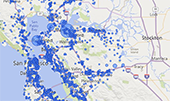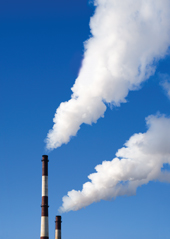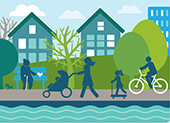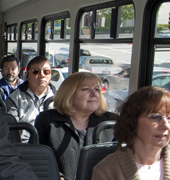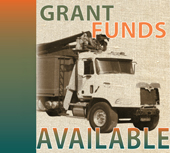|
|

|
|
|
|
November 2024 l Volume 2024-4
|
|
|
|
|
|
|
In this issue, you’ll find articles about the Air District’s recent release of the Annual Toxic Air Contaminant Report and Online Toxic Emissions Map Tool, Governor Newsom’s signing of a bill strongly supported by the Air District that triples penalty ceilings for air quality violations at Title V sources, and the Air District’s levy of a fine on Marathon Martinez Refinery that is the second highest penalty ever assessed by the agency. Other articles include the opening of a new cycle of the James Cary Smith Community Grants Program, the commemoration of the ten-year anniversary of the Bay Area Commuter Benefits Program, and the Air District’s recent assessment of penalties on Radius Recycling and Bimbo Bakeries for air quality violations. Current grant opportunities are also summarized.
|
|
|
|
|
|
|
|
|
|
|
|
|
|
Air District Releases Annual Air Toxics Report and Online Facility Toxic Emissions and Prioritization Tool
|
|
| | |
|
In early October, the Air District released the 2024 Toxic Air Contaminant Program Annual Report, along with a new user-friendly web page that allows members of the public to view toxic emission data from a comprehensive map of permitted facilities in the Bay Area. The report and map tool will help address community concerns and enhance reporting and public engagement practices under the Air Toxics “Hot Spots” Information and Assessment Act of 1987. The report and tool are key components of a recent landmark agreement between the Air District and the Environmental Democracy Project.
Toxic air contaminants are air pollutants that are known to cause or contribute to adverse health impacts. Exposure may lead to temporary minor conditions, such as eye or skin irritation, permanent injury, or more serious diseases, including cancer.
Each year, the Air District collects information and estimates toxic air contaminant emissions from permitted facilities. The Air District uses this information to ensure that facilities comply with Air District rules and regulations and to determine whether further evaluation is warranted. The new online Facility Toxic Emissions and Prioritization Tool provides the public with an easy way to view toxic air contaminant emissions and associated potential health impacts for all permitted facilities within the Bay Area.
In addition, the 2024 Toxics Annual Report identifies industrial facilities that pose cancer risks and other health threats. It includes information about each facility’s toxic air pollutant emissions and is being distributed to county boards of supervisors, city councils and local health officials across the Bay Area.
|
|
|
|
|
|
|
|
|
|
|
|
Governor Newsom Signs Bill Tripling Penalties for Air Quality Violations at Title V Sources, Including Refineries
|
|
| | |
|
In September, Governor Gavin Newsom signed AB 1465 (Wicks) into law, marking a major victory for public health and environmental justice in California. The bill, strongly supported by the Air District, triples the penalty ceilings for air quality violations at Title V sources, including refineries, significantly increasing the potential consequences for facilities that violate air quality regulations. AB 1465 addresses the current penalty structure, which had not been significantly updated since 2001, with only minor inflationary adjustments in 2018. The new law resets these penalties, providing additional incentives for polluters to prioritize safety, perform required maintenance and communicate with the public about local health concerns.
Title V sources are large industrial facilities, such as refineries, that are subject to federal air quality permitting requirements due to their potential to emit significant levels of air pollutants. These facilities must comply with strict operating standards and are regularly inspected and monitored to ensure they meet air quality regulations.
AB 1465 also directs the courts and air districts to consider public health impacts, community disruptions and other factors when determining penalties for air quality violations. Incidents at Bay Area refineries in Richmond, Benicia and Martinez have resulted in school closures, healthcare visits and shelter-in-place orders, prompting a review of existing penalties and their effectiveness in addressing such violations.
By increasing the potential financial consequences of non-compliance, the new law aims to further discourage refineries and other major facilities from continuing to operate in ways that endanger public health. AB 1465 will be particularly beneficial to communities located near heavily industrialized areas that are disproportionately impacted by air pollution.
In May of this year, the Air District’s Board of Directors adopted a groundbreaking policy that directs a significant portion of penalty funds to the communities most impacted by air quality violations. Under this policy, most of these penalty funds will be reinvested in local projects specifically designed to reduce pollution and enhance public health.
|
|
|
|
|
|
|
|
|
|
|
|
Air District Fines Marathon Martinez Refinery $5 Million
|
|
| | |
|
The Air District has fined the Marathon Martinez Refinery, which is operated by Marathon subsidiary Tesoro Refining & Marketing Company LLC, $5 million for air quality violations. This is the second largest penalty ever assessed by the Air District. This penalty resolves 59 Notices of Violation issued by the Air District between 2018 and 2022. It assesses civil penalties for flaring that occurred when Marathon idled its refinery in response to the COVID-19 pandemic. Marathon improperly flared vapors from storage tanks and loading racks that remained in operation instead of burning them in its production processes. The company also flared gases related to the shutdown, idling and decommissioning of refinery process units. Much of the refinery was shut down and idled during this time, including the gas plants and related production heaters.
This penalty also resolves other violations including:
- Improperly venting gases for two hours through a flare that was shut down for maintenance
- Three instances of visible emissions from smoky flares (5 -10 minutes each)
- Several other violations involving excess air pollution emissions, including sulfur dioxide, hydrogen sulfide and visible particulate emissions
- Delays in completing necessary repairs
- All violations included in this case have been corrected.
The Air District issues Notices of Violation when facilities violate a specific air quality regulation or rule. Violators are required to fix the problem and pay a monetary penalty commensurate with the seriousness of the violation. Corrective actions can include shutting down certain operations immediately or changing operations or equipment to come into compliance.
In May 2024, the Air District's Board of Directors adopted a groundbreaking policy that directs a significant portion of penalty funds to the communities most impacted by air quality violations. Under this policy, most of these penalty funds will be reinvested in local projects specifically designed to reduce pollution and enhance public health.
|
|
|
|
|
|
|
|
|
|
|
|
Air District’s James Cary Smith Community Grant Program Uplifts Bay Area Communities
|
|
| | |
|
The Air District is announcing the availability of $1.5 million through Cycle 2 of the James Cary Smith Community Grant Program for community groups, neighborhood associations and nonprofits to participate in decisions that impact their environment and health. The Air District seeks to partner with community leaders in the Bay Area to uplift local efforts that improve environmental health. Grants must be used to design and implement strategies that support the full involvement and leadership of communities most directly impacted by environmental injustices to influence policy and improve air quality.
The maximum amount for an individual grant is $300,000 over three years, with a maximum of $100,000 per year. Projects must be located within the Air District’s jurisdiction and preference will be given to environmental justice communities.
Applications are due by 5 PM Pacific Time on January 7, 2025. For additional information and to apply, visit the Air District's Community Grants Program web page.
Cycle 1 of the grant program was launched in 2022 and has awarded $6.4 million to 33 community-based organizations over three years. Grantees have utilized funds to launch environmental justice leadership academies, facilitate community education and develop bilingual community outreach workers.
|
|
|
|
|
|
|
|
|
|
|
|
Regional Agencies Mark Milestone in the Mandatory Bay Area Commuter Benefits Program
|
|
| | |
|
On October 1, the Air District and the Metropolitan Transportation Commission marked the 10-year anniversary of the Bay Area Commuter Benefits Program, which requires employers with 50 or more full-time employees in the region to enroll in the program, select the commuter benefit option they will provide and identify how they will promote that benefit to employees. Options include a pre-tax benefit that allows employees to exclude transit or vanpool costs from taxable income, subsidies to cover or reduce employees’ month transit or vanpool costs, employer-provided transit, a company-wide telework policy, or an alternative benefit that reduces single-occupancy commute trips.
The Air District and MTC have begun mailing thousands of courtesy notification letters of noncompliance to employers whose registration has lapsed and to employers who have not yet enrolled in the program. Annual updates are part of the program requirements.
The Air District and MTC developed the Bay Area Commuter Benefits Program in response to Senate Bill 1339, which was signed into law by then-Governor Jerry Brown in September 2012. After a two-year pilot program, Air District Regulation 14, Rule 1 was adopted by its board of directors in March 2014. The goal of the program has been to reduce greenhouse gas emissions and traffic congestion by using the federal tax code to encourage employees to commute via alternatives to driving alone.
When the pandemic halted much of the Bay Area commute, the Air District temporarily paused notification activities for the program. A grace period for employer notifications was put in place while enhanced regional outreach activities were conducted to reeducate employers and employer organizations.
To enroll in the Bay Area Commuter Benefits Program or to update their status, employers should visit the program website. Registration is free and takes approximately 15 minutes. For additional assistance, the program team may be reached at (510) 285-3183 or commuterbenefits@511.org.
|
|
|
|
|
|
|
|
|
|
|
|
Air District Fines Radius Recycling, Formerly Schnitzer Steel, $575,000 for Air Quality Violations
|
|
| | |
|
In October, the Air District announced that Radius Recycling, formerly Schnitzer Steel, has agreed to pay $575,000 to settle air quality violations that occurred at its facilities in West Oakland and San Jose. The penalty resolves eight notices of violation. Seven of the notices of violation are associated with the installation and operation of air pollution abatement equipment that the Air District and other agencies required Radius Recycling to install at its metal shredder in West Oakland. A separate notice of violation was issued to Pick-n-Pull Auto Dismantlers in San Jose, which is owned and operated by Radius Recycling, for failure to change out a carbon filter matrix used to control gasoline vapors.
In May 2024, the Air District’s Board of Directors adopted a groundbreaking policy that directs a significant portion of penalty funds to the communities most impacted by air quality violations. Under this policy, $237,500 of this penalty will be reinvested in local projects specifically designed to reduce pollution and enhance public health in the communities affected by these violations.
At its West Oakland facility, Radius Recycling shreds and sorts metal materials, such as older vehicles and appliances, which are then sold and transported from the facility for reuse in steel mills and foundries globally. Pick-n-Pull Auto Dismantlers, located in San Jose, offers self-service recycled auto parts to the general public.
In 2022, Radius Recycling installed new abatement equipment on the metal shredder at its West Oakland location to comply with Air District regulations. The mandated abatement equipment has been effective in reducing the shredder’s potential to emit precursor organic compound emissions from its stacks from approximately 236.7 tons per year to just 5.1 tons per year, as well as in greatly reducing risks from toxic air contaminants.
However, in 2022, emissions testing identified certain problems with the abatement equipment, including tuning issues that were leading to increased emissions of oxides of nitrogen and problems with a mist eliminator that allowed higher-than-permitted particulate matter emissions. Subsequent testing in late 2022 and 2023 showed that these problems had been resolved. The Air District issued these seven notices of violation for those violations and for other related issues such as late submittal of test results.
This penalty does not address notices of violation the Air District issued in connection with the August 2023 fire at the West Oakland facility. The Air District has referred those notices of violation to the Alameda County District Attorney to allow for criminal prosecution of that case. Under California law, air quality violations can be prosecuted civilly by the Air District or criminally by the District Attorney, but not both. The District Attorney’s criminal prosecution is ongoing.
|
|
|
|
|
|
|
|
|
|
|
|
Air District Fines Bimbo Bakeries $162,000 for Air Quality Violations
|
|
| | |
|
Bimbo Bakeries, USA Inc., has agreed to pay the Air District $162,000 to settle air quality violations that occurred at its facility in South San Francisco. The penalty resolves two notices of violation issued to Bimbo Bakeries, USA Inc. This settlement resolves a violation for failure to conduct annual required emissions source tests on their boilers for five years (2016-2019 and 2021), in the amount of $150,000, and a one-day, carbon monoxide exceedance violation for $12,000, comprising the global settlement of $162,000.
The Air District issues Notices of Violation when facilities violate a specific air quality regulation or rule. Violators are generally required to respond to the notice within 10 days and submit a description of the actions they will take to correct the problem. These actions can include shutting down certain operations immediately or changing operations or equipment to come into compliance.
|
|
|
|
|
|
|
|
|
|
|
|
Air District Offers Millions in Grants
|
|
| | |
|
The Air District administers a number of grant funding programs that offer incentives for clean air projects. Grant Funding for Clean Air Projects
Grant programs for Bay Area businesses and public agencies:
- Heavy-Duty Vehicle and Equipment Replacement Program - Funding is available to help fleet and equipment owners upgrade and replace eligible heavy-duty vehicles and equipment with cleaner and zero-emissions technology and the installation of supporting zero-emission infrastructure. Over $75 million is available for projects where emission reductions benefit the Air District communities most impacted by air pollution, including the AB 617-identified communities of West Oakland, East Oakland, Richmond-San Pablo, and Bayview Hunters Point/Southeast San Francisco, and other disadvantaged and low-income areas in the Bay Area. Up to $10 million is available for upgrading agricultural equipment operated within the Air District’s jurisdiction and up to $8 million is available for locomotive projects sponsored by public agencies that is operated within the Air District’s jurisdiction.
Applications are being accepted on a first-come, first-served basis until 5 PM PST on February 6, 2025, or until funding is exhausted. More information about eligible project categories, program requirements, and how to apply is available at https://www.baaqmd.gov/funding-and-incentives/apply-for-funding.
- Climate Tech Finance Loan Guarantee Program is available to support the development and purchase of climate technologies for small businesses in California. Climate entrepreneurs can apply for loan guarantees up to 80 percent of the loan principal or $5 million, whichever is less, to accelerate the growth and impact of their businesses. This program is open and accepting applications now. https://ctf.baaqmd.gov/
Grant programs available to Bay Area residents:
- Passenger Car and Light-Duty Truck Retirement – On July 1, the incentive amount that is paid by the Vehicle Buy Back Program to participating Bay Area residents increased to $1,500 per vehicle. The program accepts operable, registered, model year 1998 and older passenger cars or light-duty trucks for scrapping, removing the highest-polluting passenger vehicles from the road. www.baaqmd.gov/vbb
- Clean Cars for All Program, Passenger Car and Light-Duty Vehicle Replacement – The Clean Cars for All Program provides grants to income-qualified Bay Area residents to retire older (model year 2007 or older), high-polluting vehicles and replace them with a new or used conventional hybrid, plug-in hybrid, fuel-cell, or electric vehicle. The program is open to all Bay Area zip codes and provides grant amounts up to $12,000, which includes an additional $2,000 for participants who live in disadvantaged community census tracts that purchase a plug-in electric or fuel cell electric vehicle. Residents that don’t want to purchase a replacement vehicle can receive $7,500 towards alternative mobility options (e.g. public transit or electric bicycles).
www.baaqmd.gov/cleancarsforall
- Clean Heating Efficiently with Electric Technology (Clean HEET) – The Clean HEET incentive program is currently accepting applications on a first-come, first-served basis. All Bay Area homeowners are eligible to apply. Projects located in areas most impacted by air pollution will be prioritized first due to limited funding. Homeowners in West Oakland, East Oakland, Richmond-San Pablo, and Bayview Hunters Point/Southeast San Francisco are especially encouraged to apply.
The program reduces wintertime wood smoke pollution and improves air quality by helping to lower the costs for Bay Area homeowners to replace their existing, operational, freestanding wood stoves or wood-burning fireplace inserts with electric heat pumps. Approximately $2 million in grant funding is available to help up to 275 homeowners to scrap and replace 2019 and older wood-burning stoves or fireplace-inserts with electric heat pumps. Individual grant awards range from $3,000 - $6,500 for one stove/insert and $6,000 – $9,500 for two stove/inserts. Residents who participate in qualifying low-income assistance programs are eligible for higher incentive funding levels ranging from $7,000 for one stove to $13,500 for two stove changeouts. More information about eligible project categories and program requirements is available at https://www.baaqmd.gov/woodsmokegrant.
Other state-wide grant programs funded by Volkswagen NOx Mitigation Trust:
- VW Combustion Freight and Marine Projects – Funding is available statewide to accelerate the replacement of older, higher polluting diesel engines with the cleanest available technologies. Equipment eligible for replacement includes Class 7 and 8 freight trucks (including waste haulers, dump trucks, and concrete mixers) or their engines (2012 model year and older) that are compliant with current regulations; freight switcher locomotives or their engines; and ferry, tugboat, and towboat engines (pre-Tier 3). This solicitation is open and accepting applications on a first-come, first-served basis until all funds are fully allocated.
https://xappprod.aqmd.gov/vw/combustion.html
- VW Zero-Emission Class 8 Freight and Port Drayage Trucks - This category is intended to support the expansion of zero-emission truck availability in the heaviest weight class. Vehicles eligible for replacement include Class 8 freight trucks (including drayage trucks, waste haulers, dump trucks, and concrete mixers) or their engines (2012 model year and older). This solicitation is open and accepting applications on a first-come, first-served basis until all funds are fully allocated.
https://xappprod.aqmd.gov/vw/zero-emission.html
- VW Zero-Emission Transit and Shuttle Buses – The second installment of VW funding is available to owners of bus fleets that operate in California to support early adoption of zero-emission bus technologies to reduce harmful exposure for the state’s most sensitive populations. This program is administered by the San Joaquin Valley Air Pollution Control District. This solicitation is open and accepting applications for transit and shuttle buses on a first-come, first-served basis until all funds are fully allocated.
http://vwbusmoney.valleyair.org/
- VW Zero-Emission Freight and Marine – A competitive solicitation to award the remaining $25 million is scheduled to open later this year to fund zero-emissions cargo handling equipment, heavy-lift forklifts, ferries, tugboats, and towboats. Sign up to receive program email alerts at https://www.surveymonkey.com/r/CaliforniaVW.
|
|
|
|
|
|
|
|
|
|
|
Air District Events
|
|
This winter, the Air District and Spare the Air will be participating in the following outreach events.
November
Fall Home Show – Santa Clara
November 2-3
November and December
Christmas in the Park – San Jose
November 30 and December 14 (Air District staffing dates)
December
Benicia Holiday Market – Benicia
December 14
|
|
|
|
|
|
|
|
|
|
|


